-
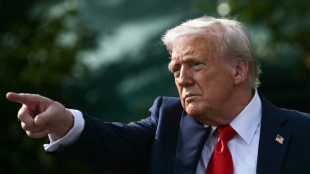 Trump signs order aimed at lowering drug prices
Trump signs order aimed at lowering drug prices
-
Paramilitaries declare rival government as Sudan war enters third year

-
 Nvidia expects $5.5 bn hit as US targets chips sent to China
Nvidia expects $5.5 bn hit as US targets chips sent to China
-
Emery targets 'next step' for Aston Villa after Champions League heroics

-
 'Gap too big' for Dortmund after first leg, says Guirassy
'Gap too big' for Dortmund after first leg, says Guirassy
-
Maradona's daughter says doctors could have prevented his death
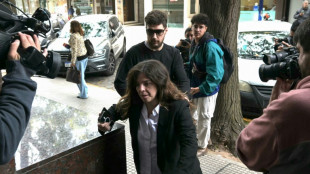
-
 Barcelona 'justified' semi-final spot despite Dortmund loss, says Flick
Barcelona 'justified' semi-final spot despite Dortmund loss, says Flick
-
'We thought the tie was over': Dembele admits PSG switched off against Villa

-
 Wine consumption falls heavily into the red
Wine consumption falls heavily into the red
-
Barca through to Champions League semis despite Guirassy hat-trick

-
 Global stocks mixed amid lingering unease over trade war
Global stocks mixed amid lingering unease over trade war
-
PSG survive Aston Villa scare to reach Champions League semis

-
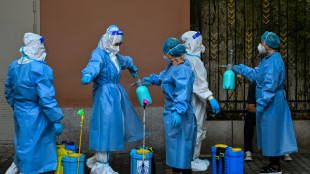 Pandemic treaty talks fight late hurdles
Pandemic treaty talks fight late hurdles
-
Trump resurrects ghost of US military bases in Panama

-
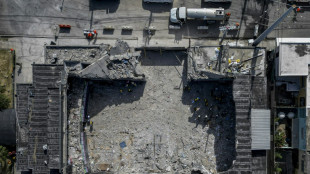 Family seeks homicide charges against owners of collapsed Dominican nightclub
Family seeks homicide charges against owners of collapsed Dominican nightclub
-
Sudan paramilitary chief declares rival government two years into war

-
 Boeing faces fresh crisis with US-China trade war
Boeing faces fresh crisis with US-China trade war
-
Trump eyes slashing State Department by 50 percent: US media

-
 Canada offers automakers tariff relief, Honda denies weighing move
Canada offers automakers tariff relief, Honda denies weighing move
-
Facebook added 'value' to Instagram, Zuckerberg says in antitrust trial

-
 French Ligue 1 clubs vote to break TV deal with DAZN
French Ligue 1 clubs vote to break TV deal with DAZN
-
Peru court sentences ex-president Humala to 15 years for graft
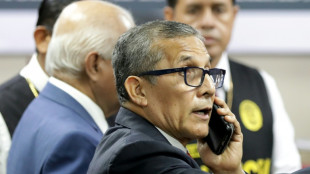
-
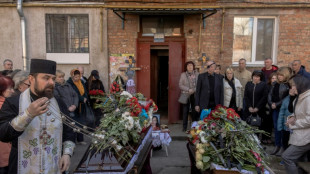 Sumy buries mother and daughter victims of Russian double strike
Sumy buries mother and daughter victims of Russian double strike
-
Trump says ball in China's court on tariffs
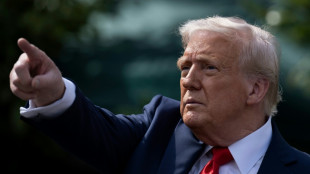
-
 Kane urges Bayern to hit the mark against Inter in Champions League
Kane urges Bayern to hit the mark against Inter in Champions League
-
Trump ramps up conflict against defiant Harvard

-
 Arteta feeding Arsenal stars 'opposite' of comeback message
Arteta feeding Arsenal stars 'opposite' of comeback message
-
France's Macron honours craftspeople who rebuilt Notre Dame

-
 Watkins left on Villa bench for PSG return
Watkins left on Villa bench for PSG return
-
Chahal stars as Punjab defend IPL's lowest total of 111 in 'best win'

-
 French swim star Marchand considered taking year-long break
French swim star Marchand considered taking year-long break
-
Chahal stars as Punjab defend IPL's lowest total of 111

-
 Universal Studios, Venice Beach to host LA 2028 events
Universal Studios, Venice Beach to host LA 2028 events
-
IOM chief urges world to step up aid for Haiti
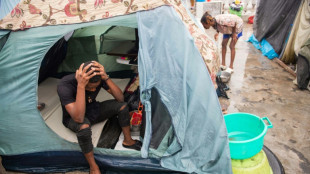
-
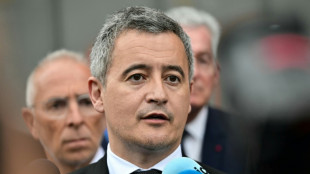 French prisons hit by mystery arson and gunfire attacks
French prisons hit by mystery arson and gunfire attacks
-
Alcaraz follows Ruud into Barcelona Open last 16

-
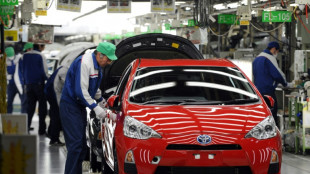 Stocks rise on bank earnings, auto tariff hopes
Stocks rise on bank earnings, auto tariff hopes
-
Trump showdown with courts in spotlight at migrant hearing
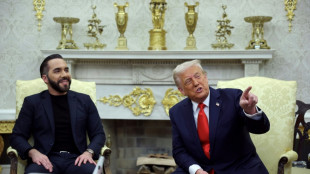
-
 Ecuador electoral council rejects claims of fraud in presidential vote
Ecuador electoral council rejects claims of fraud in presidential vote
-
Russia jails four journalists who covered Navalny

-
 Trump says China 'reneged' on Boeing deal as tensions flare
Trump says China 'reneged' on Boeing deal as tensions flare
-
Trump eyes near 50 percent cut in State Dept budget: US media

-
 Trump says would 'love' to send US citizens to El Salvador jail
Trump says would 'love' to send US citizens to El Salvador jail
-
'Unprecedented' Europe raids net 200 arrests, drugs haul

-
 Everyone thinks Real Madrid comeback 'nailed-on': Bellingham
Everyone thinks Real Madrid comeback 'nailed-on': Bellingham
-
NATO's Rutte says US-led Ukraine peace talks 'not easy'
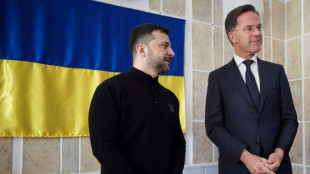
-
 Harvey Weinstein New York retrial for sex crimes begins
Harvey Weinstein New York retrial for sex crimes begins
-
More than 10% of Afghans could lose healthcare by year-end: WHO

-
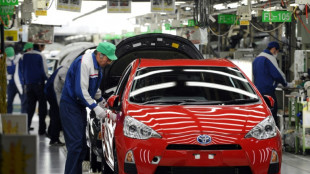 Stocks rise as auto shares surge on tariff break hopes
Stocks rise as auto shares surge on tariff break hopes
-
Facebook chief Zuckerberg testifying again in US antitrust trial

Next Generation EU a scam?
The Next Generation EU (NGEU) fund, an unprecedented European Union economic recovery package, was launched in 2020 to help member states recover from the economic and social impact of the COVID 19 pandemic. With a volume of €750 billion, divided into grants and loans, NGEU aims to make Europe greener, more digital and more resilient (European Commission, Recovery plan for Europe). However, the implementation and effectiveness of the programme have been met with controversy and criticism, leading some to call it the EU's ‘biggest scam’. This report analyses the reasons for this criticism, based on fraud cases, political tensions and economic doubts.
Fraud and misuse of funds
A key point of criticism is the high number of fraud cases affecting the programme. In April 2024, 22 people were arrested in Italy, Austria, Romania and Slovakia on charges of embezzling €600 million from the Italian National Recovery and Resilience Plan (NRRP), which is part of NGEU. The criminals used a network of accountants, service providers and notaries to fraudulently obtain non-repayable funds and transfer the money abroad.
Another case concerns the procurement of power generators for Ukraine, which was managed by the Polish government agency for strategic reserves (RARS). The European Anti-Fraud Office (OLAF) recommended the recovery of over €91 million due to serious irregularities, including inflated prices and a lack of competition (European Commission, OLAF completes investigation into suspected serious irregularities). These cases are not isolated: in 2022, OLAF recorded a 7% increase in fraud cases, with irregularities worth €1.77 billion. At the end of 2024, the European Public Prosecutor's Office (EPPO) was handling 311 active cases with an estimated €2.8 billion in damages to the EU budget, mostly related to NGEU (Balkan Insight, EU Fraud Keeps Rising as Prosecutors Investigate 38% More Cases in 2024).
Political controversies and delays
Besides the fraud cases, there were political tensions that delayed the implementation of NGEU. Poland and Hungary initially blocked the adoption of the fund due to concerns about the rule of law conditions. This led to delays in the disbursement of funds and political tensions within the EU (Wikipedia, Next Generation EU). Article 7 proceedings were opened against both countries, but their mutual support prevented sanctions, complicating the implementation of the fund (Wikipedia, Next Generation EU). These controversies show that NGEU was not only a technical financial instrument but also a political battleground, undermining confidence in the programme.
Scepticism from economists and political actors
Some economists and political actors express scepticism about the effectiveness and purpose of NGEU. A study from Comparative European Politics (2022) argues that the allocation of funds was based on existing economic and political vulnerabilities rather than the direct consequences of the pandemic. Countries with strong Euroscepticism and structural problems received the most funding per capita, regardless of the severity of the health crisis (Comparative European Politics, Voices from the past: economic and political vulnerabilities in the making of next generation EU). This could indicate that NGEU is more of a tool for stabilising weak economies, which some may see as a misuse of funds.
In Italy, the main recipient, there are doubts about the government's ability to use the funds efficiently. Although the government is celebrating the receipt of the fifth tranche of NGEU, the challenge remains of actually spending the funds and implementing the planned projects (Euractiv, Italy and the challenge of spending European funds). These difficulties underline the concern that NGEU may not deliver the promised results.

Portugal: Living Costs Soar

Is Australia’s Economy Doomed?

DOGE Fails to Slash U.S. Spending

Slovenia’s Economic Triumph

Can Poland Rescue Europe?

Finance’s Role in Economic Ruin

Trump’s Tariffs Spark Global Fear

Georgia Slips into Russia’s Grasp

Trump’s Ukraine Economic Colony Plan Stirs Debate

China Targets Dollar at US Critical Moment

EU Pledges €800 Billion for Defence to Deter Russia



